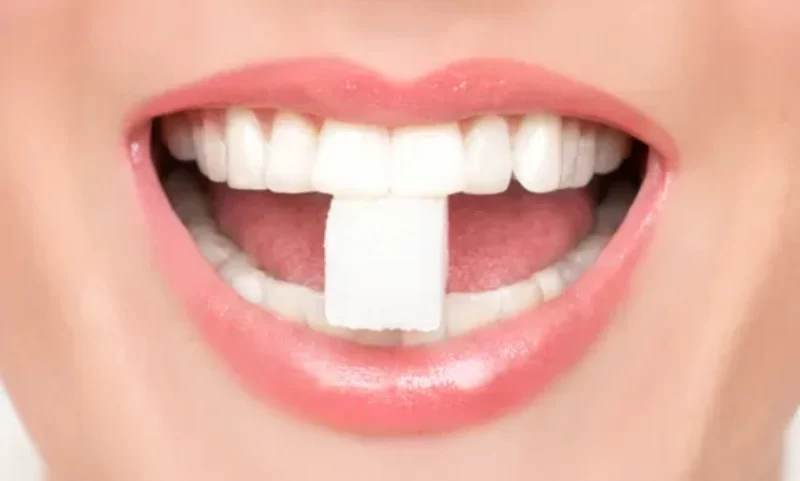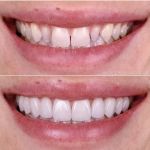
- Effects-of-Sugar-on-Teeth
- How-Sugar-Interacts-with-Oral-Bacteria
- Visible-Damage-from-Excessive-Sugar
- Real-Life-Cases-of-Sugar-Related-Tooth-Problems
- Expert-Dental-Insights-on-Prevention
- Practical-Tips-for-Reducing-Sugar-Impact
- Trusted-Support-from-Family-Dentistry-Online
Effects of Sugar on Teeth
Many people know sugar is “bad” for teeth, but few fully understand why. The effects of sugar on teeth go far beyond a sweet tooth—they can change the entire environment of the mouth. Every sugary snack or drink you consume sets off a chain reaction that can weaken enamel, create cavities, and even cause long-term oral health problems.
How Sugar Interacts with Oral Bacteria
1. Bacterial feeding process
Bacteria in the mouth feed on sugar. When this happens, they produce acid as a byproduct, which directly attacks tooth enamel. Over time, repeated exposure increases the risk of cavities.
2. The acid attack cycle
After sugar intake, acid can remain active for up to 20 minutes. If you snack frequently, this cycle repeats all day, making it difficult for teeth to recover and leading to enamel erosion.
3. Plaque formation
The acids combine with saliva and food particles to form plaque, which sticks to teeth and further damages them if not properly removed by brushing and flossing.
Visible Damage from Excessive Sugar
1. Cavities
Cavities are the most common effect of sugar on teeth. They appear when enamel breaks down and decay sets in, often requiring fillings to restore function.
2. Discoloration and sensitivity
Enamel erosion not only weakens teeth but also makes them look yellow and feel sensitive to hot or cold foods.
3. Gum issues
Excess sugar also increases plaque buildup near the gumline, which can inflame gums and potentially lead to gingivitis if left untreated.
Real Life Cases of Sugar-Related Tooth Problems
One well-known story involved a young gamer who admitted to drinking multiple sodas daily during marathon gaming sessions. Within two years, he developed several cavities and needed root canal treatments. Another case is of a teacher who used hard candies to stay energized throughout the day, only to discover deep cavities requiring crowns. These real situations show the clear effects of sugar on teeth and why moderation is essential.
Expert Dental Insights on Prevention
Dentists emphasize that sugar itself is not the only culprit—it’s the frequency of consumption that matters. Sipping a soda throughout the day is far worse than drinking it in one sitting because the exposure time is prolonged. Experts recommend limiting sugary snacks, rinsing with water after consuming sweets, and brushing twice daily with fluoride toothpaste.
Practical Tips for Reducing Sugar Impact
1. Choose healthier alternatives
Opt for fruits over candy. Natural sugars in fruits are less harmful when paired with fiber, which helps clean teeth.
2. Use sugar-free gum
Chewing gum with xylitol stimulates saliva flow, which neutralizes acids and reduces bacterial growth.
3. Schedule regular checkups
Routine dental visits catch early signs of damage. Prevention is always easier and cheaper than extensive treatments.
Trusted Support from Family Dentistry Online
If you’re concerned about the effects of sugar on teeth, Family Dentistry Online provides reliable advice, services, and products designed to help protect your oral health. From preventive care strategies to restorative treatments, this trusted resource ensures you keep your smile healthy and strong.







 Lourdes's Dentistry - Affordable Dentist4.0 (160 review)
Lourdes's Dentistry - Affordable Dentist4.0 (160 review) Silc Periodontics4.0 (169 review)
Silc Periodontics4.0 (169 review) Doc Bresler's Cavity Busters4.0 (363 review)
Doc Bresler's Cavity Busters4.0 (363 review) McCall Family Dentistry5.0 (718 review)
McCall Family Dentistry5.0 (718 review) Justin Ewell, DMD at Suncoast Dental Goodyear0.0 (0 review)
Justin Ewell, DMD at Suncoast Dental Goodyear0.0 (0 review) Harbor Point Dental at Pelham Manor4.0 (118 review)
Harbor Point Dental at Pelham Manor4.0 (118 review) The Importance of Oral Health Education During Pregnancy for a Healthy Pregnancy
The Importance of Oral Health Education During Pregnancy for a Healthy Pregnancy Best Tips for Brushing Your Teeth Properly for Healthy Gums: Essential Techniques for Oral Health
Best Tips for Brushing Your Teeth Properly for Healthy Gums: Essential Techniques for Oral Health Why Skipping Dental Checkups Can Lead to Bigger Oral Health Problems
Why Skipping Dental Checkups Can Lead to Bigger Oral Health Problems Advantages of Porcelain Dental Restorations
Advantages of Porcelain Dental Restorations How Can Diabetes Cause Tooth and Gum Problems? Preventing and Managing Oral Health Issues
How Can Diabetes Cause Tooth and Gum Problems? Preventing and Managing Oral Health Issues Healthy Habits for Promoting Good Oral Health and Hygiene: Tips for a Healthy Smile
Healthy Habits for Promoting Good Oral Health and Hygiene: Tips for a Healthy Smile